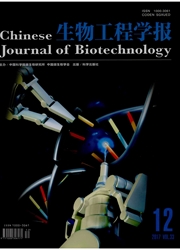

 中文摘要:
中文摘要:
肽: N-glycanase 被认为是从 endoplasmicreticulum 的错误褶层 glycoproteins translocated 的负责的forproteasome依赖的降级(嗯)到 cytosol.Therefore ,酶应当能在土著人和外国人 glycoproteins.In 之间区分现在的学习, recombinant ,酵母肽: N-glycanase , Png1p ,在 Escherichia 关口 i 被表示为包括身体并且被净化, refolded 并且描绘。结果证明 recombinant 酶有宽广 pHrange 改编,从 pH 4.0 到 pH 10.0,并且有 30 deg C.This 酶的温度是的最佳一项锌 metalloenzyme.Its 活动与 EDTA 的增加被废除并且没由增加金属离子恢复。而且,从 E.coli 的 recombinant Png1p 的 deglycosylation 效率在 vitro.When ribonuclease B ( RNase B )关于底层符合构造被调查在 60-65 deg C 或由 40-60 公里 dithiothreitol 被使中毒,由它的明显的结构的变化和最锋利的活动变化显示了,它由 Png1p 的 deglycosylation 是很突出的。由 Png1p 的 RNase B 的 deglycosylationefficiency 被发现与它的结构的符合构造和酶的活动有关。
 英文摘要:
英文摘要:
Peptide:N-glycanase has been thought to be responsible for proteasome-dependent degradation of misfolded glycoproteins translocated from the endoplasmic reticulum (ER) to the cytosol. Therefore, the enzyme was supposed to be able to distinguish between native and non-native glycoproteins. In the present study, a recombinant, yeast peptide:N-glycanase, Pnglp, was expressed in Escherichia coli as inclusion bodies and was purified, refolded and characterized. The results showed that the recombinant enzyme has a broad pH range adaptation, from pH 4.0 to pH 10.0, and has an optimum temperature of 30 ℃. This enzyme is a zinc metalloenzyme. Its activity was abolished with the addition of EDTA and not restored by adding metal ions. Furthermore, the deglycosylation efficiency of recombinant Pnglp from E. coli was investigated with respect to the substrate conformation in vitro. When ribonuclease B (RNase B) was denatured at 60-65 ℃ or by 40-60 mM dithiothreitol, indicated by its obvious structural change and sharpest activity change, its deglycosylation by Pnglp was most prominent. The deglycosylation efficiency of RNase B by Pnglp was found to be related to its structural conformation and enzymatic activity.
 同期刊论文项目
同期刊论文项目
 同项目期刊论文
同项目期刊论文
 期刊信息
期刊信息
